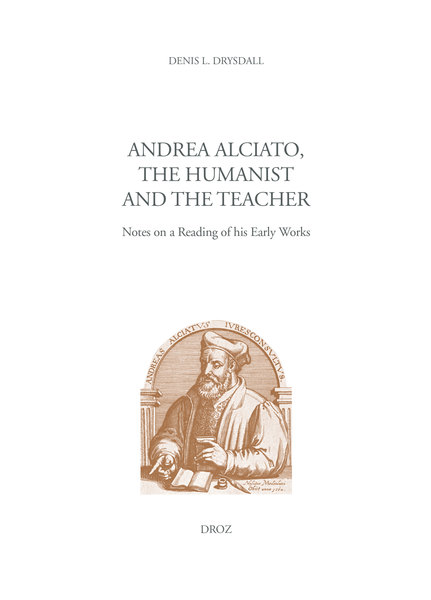Denis L. Drysdall, Andrea Alciato, the Humanist and the Teacher Notes on a Reading of his Early Works
Denis L. Drysdall, Andrea Alciato, the Humanist and the Teacher Notes on a Reading of his Early Works, Genève, Droz, 2022

Denis L. Drysdall, Andrea Alciato, the Humanist and the Teacher Notes on a Reading of his Early Works, Genève, Droz, 2022, coll. Travaux d'humanisme et de Renaissance, ISBN : 978-2-600-06372-2, 208 pages, 62,25 euros.
The attention given to Alciato in recent years has been concerned mostly with his “Emblemata”. This term, used originally as the title of a compilation of epigrams describing personal devices, became very soon the name of a new genre of poem and illustration widely used in architectural and artistic ornamentation. In his lifetime however Alciato was better known in Italy and France as a jurist and philologist who, equipped with an extraordinary knowledge of classical literature, questioned the interpretations of his predecessors, the commentators and glossators. At the same time he was famous as a teacher who attracted great numbers of students by the clarity and concision of his delivery. This book, which offers a view of his personnality, his method, and his place as a teacher of the law between mos italicus and mos gallicus, is based on a reading of works not always accessible to specialists of the emblems.
Présentation sur le site de l’éditeur
SOMMAIRE
CONTENTS
Preface
Chapter One: The Budding Humanist. In Bifum
Chapter Two: History of Lombardy
The “Antiquitates mediolanenses”
Inscriptions and Symbolism
Inscriptions in later works
The Rerum patriae libri IV
Chapter Three: Philology: the Method
The Annotationes and the Opusculum (1515)
The Praetermissa (1518)
The Annotationes in Tacitum
Chapter Four: Philology: the Method Applied
The Dispunctiones (1518)
The Paradoxa
De eo quod interest
Declamatio
Chapter Five: The Teacher at Avignon
De stipulationum divisionibus
De verborum obligationibus, 1519
Chapter Six: Religion and Philosophy. Contra vitam monasticam
Chapter Seven: Philology: a Theory of Language
The Commentaria
De verborum significatione libri quatuor
Book 1
“Proprietas”
“Proprietas” in law
“Proprietas” and the “plebiscitum municipale”
“Proprietas” and the avoidance of inequities
Book 2
“Improprietas”
“Usus”
“Extensio” as a means of interpretation
Book 3
Book 4
The dedication to Archbishop de Tournon
Chapter Eight: The Teacher at Bourges
Ad rescripta principum commentarii. “Letter to the Reader”
Chapter Nine: Philology: “Obiter dicta”. Parergon iuris
Chapter Ten: The Poet
Emblemata
“Philargyrus”
Conclusions
Works Cited
Index